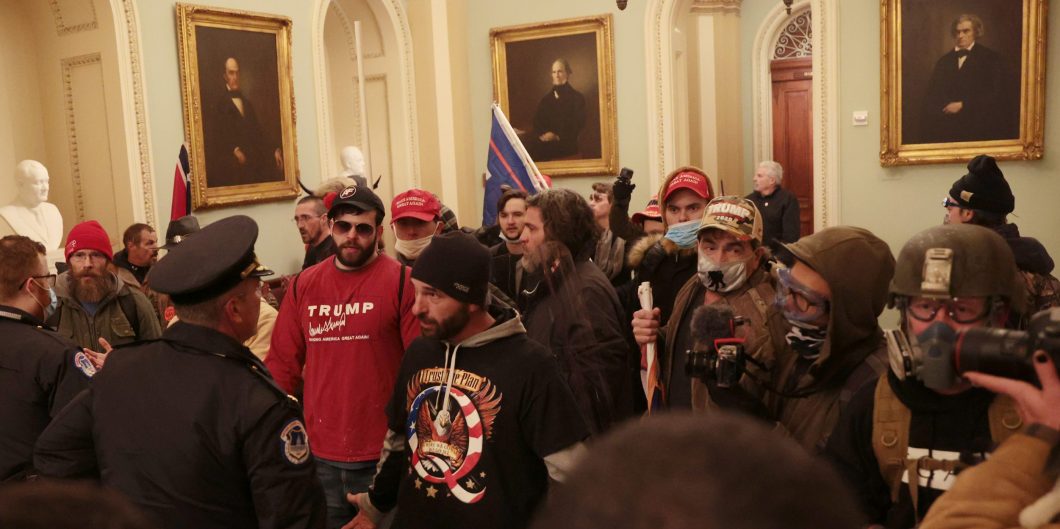Redeeming the Decadent Time
I wish to thank Nathan Pinkoski, Nick Burns, and Micah Mattix for their thoughtful responses to my Lasch essay. I hope they will receive my comments below in the same spirit of charitable engagement with which I received theirs.
Nathan Pinkoski is absolutely correct to identify a tension in my own thinking over the state of our liberal democracy. With Patrick Deneen, I see the many failures of liberal democracy in our time, and like Professor Deneen, I can’t see what could plausibly replace it. In my view, the loss of a shared commitment to Christianity, in however attenuated a form, is the main source of our collective undoing.
Nevertheless, as a religiously and socially conservative Christian who has become a minority in this formerly Christian nation, the best chance for my people’s schools, institutions, careers, and so forth, to survive in a post-Christian America is by standing behind the First Amendment shield. I am not nearly as confident as David French is that the constitutional shield will hold, but again, what else is there? Pinkoski is right: this is an untenable place to stand, but to abandon this territory, however embattled, strikes me as even less desirable.
Here’s what I mean: Pinkoski faults me for glossing over Lasch’s commitment to noble virtues as the basis on which a decent democratic political order should be constructed. In Pinkoski’s characterization of Lasch’s view, “democracy deserves to survive by the standard it sets for human excellence. It stands or falls by whether it can achieve what is noble.”
Can it? Where is the nobility in any contemporary iteration of American populism? Was there anything noble about the mob that attacked the Capitol on January 6? Did Donald Trump appeal to virtue, or exemplify virtue, as opposed to cheap demagoguery? I still hope for some form of “virtue populism” to emerge from the Right, but I’m sorry to say that I lack faith that America has the resources today with which to generate such a morally robust movement. University of Notre Dame sociologist Christopher Smith’s research into the spiritual lives of Americans under 40 makes for depressing reading. Noble qualities like disciplined self-sacrifice, commitment to the common good, defense of the family, respect for tradition—none of these things much matter to the young. As Smith has written, for most of the coming generation, “all that society is, apparently, is a collection of autonomous individuals out to enjoy life.”
Philip Rieff saw it all coming as far back as the mid-1960s. A discussion of the effects of the therapeutic, consumer capitalist society on American politics is beyond the scope of my remarks here. My point is simply that, for complicated historical reasons, the sources of moral order on which Lasch would depend for authentic populist renewal are scarce. We are a decadent and demoralized people.
I left the Republican Party in 2008, disgusted with both the Iraq War and the party’s love affair with Wall Street. I did not vote for Trump in 2016, because I thought he was a phony, but I was not a Never Trumper either. I was happy to see the GOP get its comeuppance, and was pleased that the new president might actually turn the Republicans into a socially conservative, economically populist party. He might have done so had he not been crippled by his own character. The fact that even to this day, Trump commands the loyalty of the GOP base, despite his moral unworthiness, and his failure to accomplish much in office for the people who elected him, adds to my pessimism about populism’s prospects. I hope I’m wrong, but it seems to me that as long as the Right is locked into its self-destructive embrace of Trump, no capable populist-right leaders can emerge. We need J.D. Vances, but we’re going to get Marjorie Taylor Greenes.
Again, it’s fair to criticize me for recognizing the failures of liberal democracy, but not being willing to abandon its institutions. You could say that I am exercising a conservative’s prudential judgment in not wanting to tear down something without having a good idea of what should replace it. Or less charitably, you could say that I’m guilty of what the historian Livy said of the last days of the Republic: that Rome had reached a point in which people could bear neither their vices nor the cure.
We have created a culture in which one gains power by asserting weakness. We have even reached the point in which valorizing personal industry and meritorious accomplishment are denounced as manifestations of “whiteness.”
Nick Burns’ remarks about Lasch’s critique of American journalism resonate with me. Having spent most of my career inside newsrooms—and as part of a vanishingly small conservative minority at that—I know all too well the problems with the doctrine of “objectivity.” But if you As I said in my essay, Lasch could not have foreseen what the Internet would do to political discourse. We are all familiar with the effects of narrative collapse in the postmodern era, a phenomenon that was put on a rocket sled by the Internet. I am pleased to have far more sources of news and information at my fingertips than previous generations, but is it really the case that access to more diverse information has made us more responsible with it? If a tour of Ivy League campuses and the newsroom of The New York Times and the Washington Post would turn one into a populist, marinating for a day or two in social media and in the comments sections on blogs would make the most ardent democrat put in a good word for aristocracy.
I should clarify my position on two points Burns makes. First, I suggested that Poland and Hungary offer examples of conservative populism in power from which we Americans might learn, not because I expect an American Orbanism, but because the ruling right-wing parties in both countries have won repeatedly on policies that reject neoliberal economics and globalist pieties. Second, Burns seems to think my reference to St. Benedict (quoting Alasdair MacIntyre) is about waiting for God to save us. What I meant was that we need a charismatic genius to establish cultural practices and communal institutions—like Benedictine monasticism in the early Middle Ages—that might lead, over time, to renewal. In other words, our direst problems are cultural, not political.
Burns’ lines about how Lasch prized economic autonomy, and a rejection of “paternalistic institutions,” as the health of the American republic, brings me back to my core concern: that the American people may be too far gone to restore the nation. Burns is right that the era of the yeoman farmer is ancient history, but we can still recognize in our contemporary context the admirable character traits of self-sufficiency and independence. Can you imagine what Lasch would do with today’s victim culture? It was already well established in universities at the time of Lasch’s death, and has since then metastasized in the body politic. We have created a culture in which one gains power by asserting weakness. We have even reached the point in which valorizing personal industry and meritorious accomplishment are denounced as manifestations of “whiteness.”
Do most Americans believe this nonsense? I doubt it. But managerial elites do, and are building a system that indoctrinates the young into the precepts of victim culture and its conjoined twin, identity politics. A robust populism that confidently rejected this poison could still win elections, I’d wager, but Trump’s vanity, constant self-pity and peacocky grievance rendered Trumpism as little more than victimology for right-wing white people. Whatever kind of populism Trump embodied, it’s not a populism of excellence. After a failed, shambling administration, Trump left office with massive support from the conservative base, over half of whom (say polls) want him to run again in 2024. American elites might fear that excellence is a code word for “white supremacy,” but voters of the populist right don’t seem to care about it at all. Burns’ line about Lasch’s proposed solutions as “simply incoherent in the contemporary landscape” comes to mind.
Micah Mattix says that a healthy democracy needs art that forms the moral imagination in ways that leads people to the excellence that self-rule requires. The late filmmaker Andrei Tarkovsky voiced a similar sentiment in a very Russian way:
The allotted function of art is not, as is often assumed, to put across ideas, to propagate thoughts, to serve as an example. The aim of art is to prepare a person for death, to plough and harrow his soul, rendering it capable of turning to good.
I quite agree with Mattix, but these days, it’s hard to imagine that either high art or popular art aspiring to harrow our souls, rendering them capable of turning to good—either to prepare to die well, or to prepare to live well. Novels do not have the influence they once did. The stage is a boutique concern. Nobody cares about painting. Music is a spent cultural force. The most celebrated films are superhero movies praised for their box office mojo. Artistically, we are stagnant, as befits a decadent society.
You can’t have a decent politics without a decent culture, and you can’t have culture without cult. I maintain that we still await another—doubtless very different—St. Benedict.

